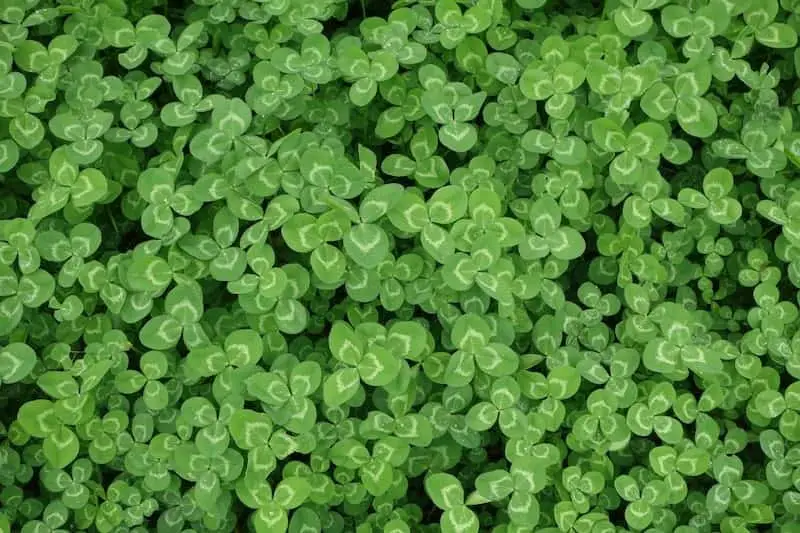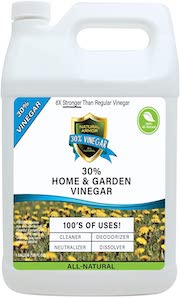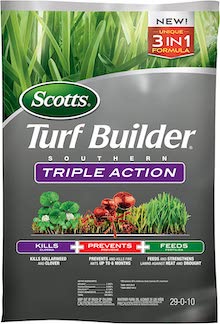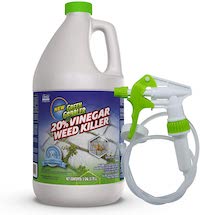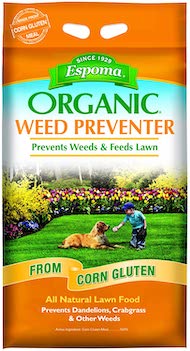The Ultimate Guide to Removing Clover Naturally
Has clover taken over your lawn? Does your lawn look messy and in disarray? Is the clover attracting bugs and bees to your lawn? If you answered yes to any of these questions, our guide to getting rid of clover naturally can help.
So, how do you get rid of clover naturally? You can get rid of clover naturally by manually removing the clover, using a vinegar and water solution, fertilizing your lawn, depriving it of oxygen, mowing the lawn higher, or using an organic weed killer.
In this post, we will share several solutions for how to remove the clover in your lawn naturally as well as some other less natural options.
Manually Removing the Clover
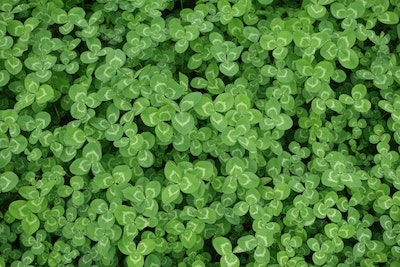 Similar to the best way to kill dandelions in your lawn, the most natural way to remove clover is by manually removing clumps from your lawn. The best thing to do when you see clover clumps on your lawn is to pull them up completely including the roots.
Similar to the best way to kill dandelions in your lawn, the most natural way to remove clover is by manually removing clumps from your lawn. The best thing to do when you see clover clumps on your lawn is to pull them up completely including the roots.
To do this, loosen the soil around the roots, grab the base of the plant, and pull gently to remove the entire clover plant. Repeat this process until you remove all the clovers from your lawn.
This is the best way to remove clover from your lawn and even though it may take longer than other methods, the efforts pay off since you are pulling the roots out the clover shouldn’t grow back. As this is an exhausting process, it is important to weigh the advantages of other solutions. If you rent your home, you may want to contact your Houston Property Management company to ask for suggestions.
Vinegar and Water Solution
You create your own non-toxic clover-killing solution using vinegar and water.
You will need:
- 1 cup vinegar
- 1 cup water
- 1 drop dish soap
- Spray bottle
Mix the vinegar water and dish soap in the spray bottle. Shake it and spray over any patches of clover. The soap will help the vinegar stick to the leaves and the vinegar will help the clover dry out.
It may take several weeks of spraying for the solution to completely dry out the clover. The solution can, however, damage the grass so use carefully.
Fertilizing Your Lawn
Most fertilizers contain nitrogen which helps keep clover growth down. If your lawn is well-fertilized it will lessen the likelihood of clover overtaking your lawn. It is the lack of nitrogen in the soil that allows the clover to grow, so try to buy a nitrogen-rich formula. Sometimes organic fertilizers will work if you have a small amount of clover, but if clover is still a big problem, stick to standard fertilizer that is not slow release.
Slow-release, nitrogen-rich organic fertilizer can be helpful in preventing clover growth in the first place and can lead to a better, healthier lawn in the long run. Common organic fertilizers include cow manure, guano, blood meal, bone meal, earthworm castings, and liquid kelp. It is important to read the directions carefully, however, as you may experience yellow grass after fertilizing improperly.
Depriving Clover of Oxygen
Another natural way to get rid of clover is to deprive it of oxygen and sunlight and not allowing it to grow. To do this, place a plastic sheet or garbage bag over the clover patch, securing the corners so it won’t blow away. This should kill the weeds in a couple of weeks, but don’t use this method long-term or the surrounding grass could be damaged as well. This is a good method for larger patches of clover.
This method is also helpful to get rid of other types of weeds like crabgrass that may be on your lawn. It’s effective if you have the time to put into it.
Mowing the Lawn Higher
Some people may think that mowing closer to the ground will get rid of the clover, but that is only a temporary fix. Clover has a shallow root system and grows close to the ground. If you mow your grass higher, the grass will block out the light and not allow it to reach the clover and hopefully cause the clover to die. When you mow your grass under 3 inches, it stresses the grass and gives the clover the advantage. So mow higher and allow the grass to grow long and overtake the clover plants.
Using an Organic Weed Killer
There is an excellent organic weed killer available online called A.D.I.O.S. (Advanced Development in Organic Solutions) which is an eco-friendly post-emergent control used on broadleaf weeds. It is non-toxic and can be used in parks, playgrounds, lawns, gardens, flower beds, and many other places. It uses selective weed control which means it will not harm the grass or surrounding plants, only the clover or other weeds it touches. It is an excellent choice if none of the other options are feasible.
Corn Meal Gluten
Corn meal gluten is available at garden stores and online and is effective in preventing weed growth. It does not kill existing weeds but will prevent any new weed seedlings to grow by drying out the new weed’s root. Corn meal gluten is also a source of nitrogen which also helps prevent weed growth.
Because of how clover grows, it is important to apply corn gluten at the right time. Corn gluten does not stop seeds from germinating but inhibits those seeds from forming roots. So if the conditions are too wet when the corn gluten is applied, it will not be effective. Furthermore, the product only remains effective for five to six weeks after application so it is important to not miss the window of opportunity to prevent weed growth.
![]() While clover may not look attractive on your lawn, there are many reasons why keeping clover may actually be beneficial. Here are the top reasons why you may want to keep clover on your lawn.
While clover may not look attractive on your lawn, there are many reasons why keeping clover may actually be beneficial. Here are the top reasons why you may want to keep clover on your lawn.
Reasons to Keep Clover in Your Lawn
Clover isn’t always a bad thing! Here are some of the reasons homeowners may choose to leave clover in their lawn:
Clover Fertilizes Your Lawn
Clover has a symbiotic relationship with good bacteria that attach themselves to its roots. This bacteria absorbs nitrogen from the environment which helps give the grass its green color. Where you have plenty of clover you will notice the grass is thicker and greener. You may worry that clover will overtake your lawn, but that won’t happen. Clover actually helps your lawn thrive. Without clover, your lawn could dry out and turn brown from the summer heat, but with the clover it could stay green and lush.
Clover is Versatile
Whether your yard is full sun or partial shade, clover is tolerant of many conditions and outcompetes other weeds. Some of the newer micro-clovers are even more tolerant of shade and can grow in high-traffic areas. Depending on where you live, a clover lawn could provide lush year-round greenery.
No Burn Marks
Unlike grass, clover does not show yellow burn marks from pet urine like grass marks. Just another perk of having clover on your lawn!
Wildlife Love Clover
Wildlife like deer and bees love clover and may come to your lawn looking for a tasty snack. This may not always be a positive thing, but you’re helping to feed nature!
Clover Needs Less Water
Clover is drought tolerant and grows despite lack of water once established. This is unlike regular grass and is a real perk of having clover.
Clover is Affordable
Clover lawns are affordable and easy to grow!
What is Causing Clover Growth in my Lawn?
Looking to get to the bottom it the issue? Here are some reasons clover may be growing in your lawn:
Wrong Soil pH
Most clovers can grow in nearly any pH. The ideal soil pH—how alkaline or acidic the soil is—for most lawns is between 6.0 and 7.0. If your lawn’s soil is too acidic, it will be harder for grass to grow, and much easier for clover.
If you think pH might be the problem with your soil, contact your extension service to learn how to take a soil sample. Once you know what the pH of your soil is you can learn what solution is best fitted to your situation. Generally, lime is added to raise the pH, and sulfur is added to lower the pH, and adding compost can naturally correct your pH.
Poor Soil Nutrient Levels
Clover thrives in soil with poor nutrient levels, especially nitrogen. Grass needs nitrogen to be able to grow well, but clover, as mentioned previously, can obtain nitrogen from the air and essentially make its own fertilizer.
As mentioned previously, organic lawn fertilizer can help boost these nitrogen levels and encourage healthy grass growth while discouraging clover growth.
Not Enough Water
If your grass doesn’t get enough water it becomes stressed, leaving more room for weeds like clover to grow. To fix this try watering slowly and deeply. The soil should be moist nearly 4 to 5 feet beneath you. Water two to three times a week during dry periods. Watering in the mornings can help prevent various lawn diseases.
Soil is Compacted
Clover grows better in compacted soil than grass does. Clover has longer roots which allow it to access water better than grass can. To fix this problem you can use a process called core aeration. It loosens compacted or heavy soils, can create a better growing environment for turfgrass, and help reduce the amount of clover and other weeds in the lawn.

